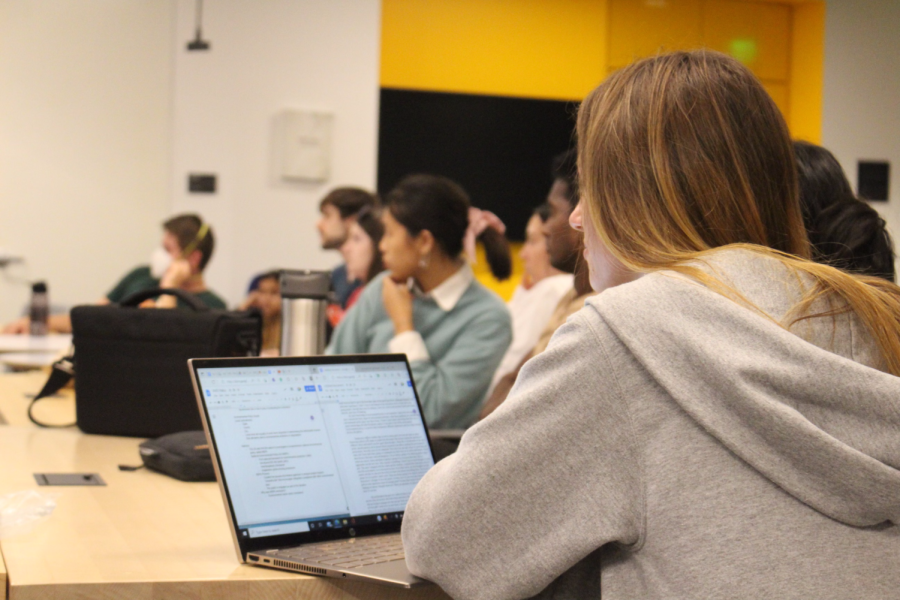After adopting a new budget request process, Student Government funded approximately half of all student organizations’ budget requests this semester, sparking frustration and confusion among some student groups.
According to an email signed by the Student Government Budget Committee and Student Government Advisor Vanessa Pearson, all student group requests could not be funded in full because of the high volume of requests for the fall, over $750,000.
Student Government Budget Committee Member Areeb Atheeque ‘25 wrote in an email that he could not share a copy of the current and previous budgets with The Lafayette because of confidentiality concerns.
The Student Government simply did not have enough money to meet student organizations’ requests, Student Government Treasurer Jordan Shaibani ‘24 said.
“We just want to try to make sure that as many students were getting as much as we possibly could give. We just didn’t have as much to give as we would like to,” she said.
She added that the Budget Committee took into consideration the fact that funds would eventually have to be allocated during the spring semester, a time when clubs are generally more active on campus and hosting larger events.
Vice President of Finance & Administration Craig Becker wrote in an email that the college billed and credited Student Government $461,187 for fall 2022. This amount comes from the $171 student fee that is paid by each of Lafayette’s 2,697 students. Shaibani wrote in a message to executive board members this past Monday that $377,800 would be allocated to student organizations.
For the past five academic years, the amount of student fees collected and allocated to Student Government has been increasing. While it is too early to determine whether Student Government received more overall funding from student fees this year, it appears to be on track to surpass last year’s total amount collected – which was $870,210 – due to the increased student fee and the greater number of enrolled students.
When reviewing budget requests initially, the Budget Committee evaluated each request line by line and allocated funds based on “the mission of the organization, overall contribution to the campus, and accessibility of all students to participate,” according to the aforementioned email.
Some student groups disagreed with the Budget Committee’s decisions and felt left out of the process.
“We [requested] under $1,000 for every single event that we do for the entire semester,” Emma Hartman ‘23, co-president of the Lafayette Happiness Project, said. “And we still had so much cut that we were kind of shocked.”
Other organizations, such as the Lafayette Outdoors Society, were concerned about the strain that the lack of funding would put on its members.
“Because we didn’t get as much as we wanted, we do have to rely on our dues a little bit more significantly, which we haven’t done in the past,” Courtenay Lampert ‘24, vice president of the Lafayette Outdoors Society, said. “Which … is a little bit disappointing because not everyone feels comfortable or can afford paying dues.”
Among the student organizations who felt discomforted by the lack of transparency over the budget allocation process was The Lafayette. With about half of its funds slashed as of Thursday morning, the lack of funding could mean that the newspaper would have to stop publishing print issues halfway into the semester.
The cause of the large discrepancy between requested and approved funds is due in part to the new budget request process adopted by Student Government starting this year. Previously, student groups would submit a budget at the beginning of the school year but had the chance to supplement these funds with weekly requests for additional money.
To try and remedy the overspending and lack of foresight that this prior system seemed to foster among student organizations, Student Government revised the budget process so that clubs would submit their budget for the entire semester within the first few weeks of the semester beginning. The process of requesting funds mid-semester became more strict, as clubs would have to show that the need for the funds they are requesting arose unexpectedly.
This meant many student organizations likely requested more funds than they needed due to fear of not having enough money for all their events throughout the semester.
Director of the Sustainability Committee Remy Oktay ‘24, who voted in favor of the budget, compared the process to bank runs.
“When people perceive there being limited supply, there’s an increase in demand,” he said.
Michael Butler ‘22, who led the initiative to implement the current budget request process last year, said that he didn’t expect the new system to create the “free-for-all” that it seems to have. He emphasized the need for Student Government to connect with student organizations and understand their circumstances when it comes to budget requests.
“I do think it does take that extra step of effort by Student Government to make something like this work of really talking to club leaders and seeing what their needs are,” Butler said.
The Budget Committee held office hours this past Wednesday to field questions from student organizations about their allocated budgets. Shaibani estimated that approximately 15 student organizations showed up at the office hours.
The Lafayette Happiness Project was one such organization. Even after attending the office hours, Hartman didn’t feel all her concerns were addressed.
Shaibani said that increasing communication was a key goal of the budget committee. She noted how the Budget Committee changed OurCampus to make it more user-friendly, provided guidelines on how to submit a budget request and worked hard to provide a quick turnaround for student organizations.
Lampert, who said she was “disappointed but not necessarily surprised” by the budget allocations, appreciated the improved clarity of the budget process.
“They were honest with us. And I think the communication about it has been as good as it could have been,” Lampert said. “[The members of the Budget Committee] were in quite a difficult position as well.”
With the Student Government budget approval process in such an early stage, Butler encouraged naysayers to give the change some time.
“This is the first time we’re using it. I think a big change like this in allocations, it’s going to take time to really adjust it,” Butler said. “I’m not saying that there aren’t valid concerns … but I think to declare the system dead the first time around is not the way to do it.”
Disclaimer: Managing Editor Trebor Maitin ’24 is the director of the Public Relations and Marketing Committee and News Editor Emma Chen ’24 is a representative on the Equity and Inclusion Committee. Neither contributed writing or editing to this article.








































































































